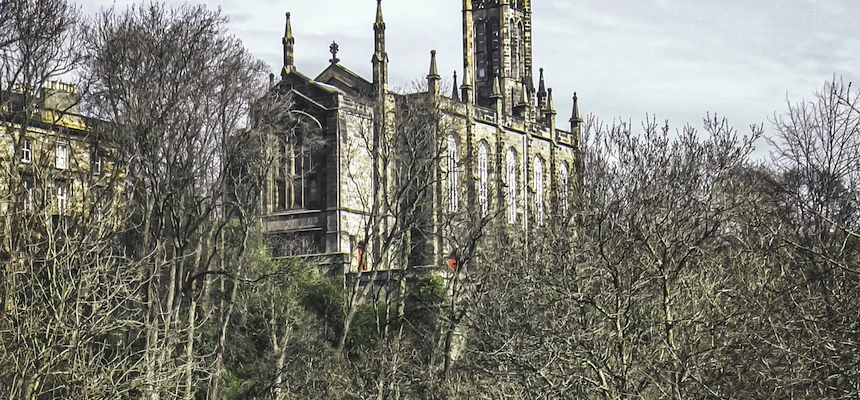
Roland, or Orlando, Bandinelli of Siena was pope from 7 September 1159 to 30 August 1181. His was the longest reign since Adrian I in the eighth century.
Born around 1100-1105, Orlando probably studied at Bologna where he became a renowned canonist and lawyer, writing commentary on the “Decretum” of Gratian.
After a relatively long term in academia, Orlando caught the eye of Pope Eugene III. He soon came to Rome and became cardinal deacon of Saints Cosmos and Damian Church. Later he became cardinal priest of St. Mark’s. In 1153, Orlando became the papal chancellor. He was the “soul” of the party of independence cardinals, opposed to the German emperor Frederick Barbarossa.
Within three years, Cardinal Orlando successfully negotiated the Treaty of Benevento, restoring peaceful relations between the Vatican and the Norman Kingdom of Sicily. But a year later, at the Diet of Besancon, he, along with Cardinal Bernard of San Clemente, delivered a message implying that Barbarossa was a papal vassal. This was a serious diplomatic incident. The emperor misunderstood the terminology and was insulted. Orlando was definitely not in Barbarossa’s favor after that.
The Papacy
Adrian IV died in the early fall of 1159. The election was another irregular one. Orlando became the next pope, taking the name Alexander III. Some cardinals elected the cardinal priest Octavian, who took the name Victor IV. He was one of four anti-popes during Alexander’s reign. Only Portugal, Sicily and Spain approved Alexander’s election. Octavian was a friend of Barbarossa and a friend of the rulers of Rome. So, he had Rome’s support. At the council of 1160 in Pavia, convened by the Emperor, only Victor IV was present and was declared the rightful pope, thereby earning for Frederick Alexander’s hostility. PopeAlexander, obviously, could not stay in Rome. From 1162-1165, he spent time in Sicily and France. In the end, it appeared that the Pope’s living in France did much for the dignity of the papacy.
In 1161, King Geza II of Hungary recognized Alexander as the legal pope and the only one who could exercise the rite of investiture. Within a short period of time, Louis VII of France and Henry II of England recognized Alexander’s authority.
Pope Alexander had an actively political papacy. He was the first pope to pay attention to missionary activities east of the Baltic Sea. That is, Sweden, Estonia and Finland. He legitimized the widespread use of forced conversion as an established tactic.
In 1166, the Byzantine emperor Manuel I sent an embassy to Alexander. The ambassadors insisted that the Great Schism could be ended if Alexander recognized Manuel as an emperor. In exchange, Manuel would supply Alexander with men and money to restore his temporal authority in southern Italy. Alexander did not reply. Two years later, Manuel sent another embassy with a similar request. This time, the Pope rejected it as too difficult to achieve. He feared the Byzantine access to Southern Italy if he owed his position to their support.
Most people know the story of Thomas a Becket and King Henry II of England: friends who became enemies. ST. Thomas demanded the rights of the Church. Henry ordered the archbishop’s assassination. After that, Alexander forced Henry to apologize and, then, negotiated for the rights that Henry would not give Thomas. Three years after Becket’s death, Pope Alexander canonized him.
During this time, Barbarossa kept replacing the anti-popes. After Victor IV came Pascal III and Calixtus III. The emperor’s attempts to control the papacy led to a truce between all the nobles of northern Italy, forming the Lombard League, lead by the Pope. It all came to a head in May 1176 at the Battle of Legnano. The Lombard nobles defeated the emperor’s army. Barbarossa surrendered and finally recognized Alexander as pope at the Peace of Venice in 1177.
However, Frederick set up another another anti-pope soon after, Innocent III. Alexander had to leave Rome once again. But, with sufficient money, allies of Pope Alexander bought off or otherwise deposed of Innocent III in January 1180.
Meanwhile, Pope Alexander called for the Third Council of Lateran. His goal was to end the ongoing anti-pope phenomenon. It was established that two-thirds of cardinals must vote to elect a pope. This still stands today.
Pope Alexander III died 30 August 1181, having ruled just short of 22 years. His epitaph reads: “the Light of the Clergy, the Ornament of the Church, the Father of his City and of the World.”

Recent Comments